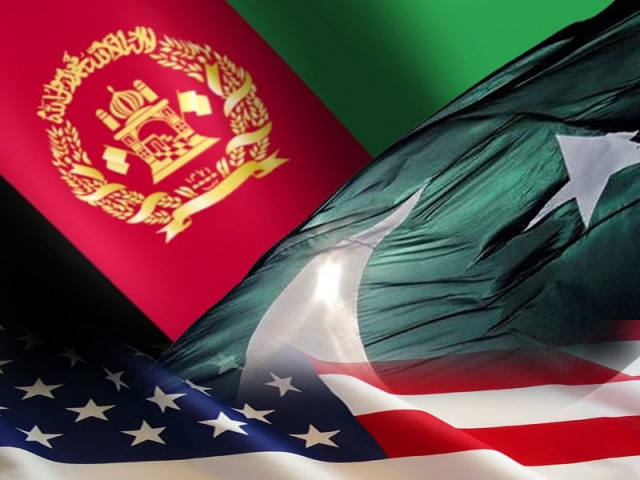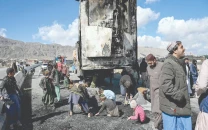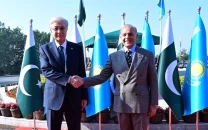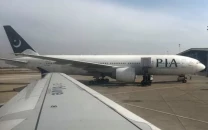Analysis: Muddled US tactics can be blamed for Doha deadlock
As diplomacy aims for dialogue & election in Afghanistan, Obama admin promises things that are just incompatible goals

As diplomacy aims for dialogue & election in Afghanistan, Obama admin promises things that are just incompatible goals.
US Secretary of State John Kerry is working overtime to save the Doha peace process from becoming stillborn. The upheaval he is dealing with has been largely created by the Taliban’s naming of their office in Doha as a sort of a mission of the Islamic Emirate of Afghanistan.
Statements coming out of Washington tend to suggest that if the Taliban had not pulled a fast one on everyone, the talks between the US and their representatives would have begun by now and Kerry instead of acting as a fire engine putting out the flames of discontent in three capitals – Kabul, Doha and Islamabad – would be reporting back happy news to his boss, President Barack Obama.
However, the snags hampering this Afghan peace push relate more to the contradictory tactics Washington has pursued in the process. In a way Secretary Kerry is fighting a self-ignited problem.
As quiet diplomacy proceeded towards the aim of creating space for a broad-based dialogue and an all-inclusive election in Afghanistan, the Obama administration promised different things to different players, not realising that these were incompatible goals.
To President Hamid Karzai’s regime it promised centrality in negotiations with the Taliban. The White House did a fair job of winning Karzai’s backing for the talks with the Taliban in return for the commitment that soon after the office in Doha was opened his High Peace Council would be there on the table. This placated the Afghan president who in return agreed to be a good sport in meeting long-term US interests in his county by taking the bilateral security agreement to the logical conclusion. The agreement would determine how many bases and troops the US can retain in Afghanistan after combat operations end next year.
Towards the Taliban the US posture wasn’t truly clear but it conveyed at least a pressing sense that the Doha dialogue would determine America’s future course of action, and while keeping Karzai in good humour was important this would not be a make-or-break factor in these talks.
To Pakistan, Washington’s intense interaction centred around two points: one, the Taliban should be convinced to distance themselves from al Qaeda; they should not allow Afghan soil to be used for attacks against US interests; and they should be ready to take part in the electoral process, under an Afghan constitution that could be modified through mutual consultation. The second issue related to whether all these points should be demands (preconditions) or results (end conditions) of negotiations. There was a general understanding between Islamabad and Washington that the Doha dialogue would not be pre-conditioned. Instead the process should be pursued to achieve these results.
Pakistani officials insist that the idea of the Taliban agreeing to meeting the High Peace Council as a Karzai representative was never a centrepiece of their engagement with Washington. They instead claim that the US had been told in so many words that in Islamabad’s assessment the Taliban would not engage with Karzai even though they know that the High Peace Council, in spite of being handpicked, had reservations about the Afghan president. Pakistani officials also say that senior US officials repeatedly defined Karzai as a player with important but limited role in this entire initiative whose core idea was to stabilise Afghanistan by talking to the Taliban. They say the calendar of talks was prepared and events were tick marked on it only because the US wanted direct engagement with the Taliban.
These parallel but mutually conflicting paths taken by the US created different expectations with the Doha process. For Karzai Doha meant, in the post US forces exit situation, legitimising and securing himself and his allied interest groups in a power arrangement where the Taliban would endorse his credentials as a key player; for the Taliban Doha stood for the US running out of options and looking for ways to stabilise Afghanistan by talking to them directly by passing, at least in the initial stage, Karzai’s representatives; to Pakistan the whole effort was evidence that the Obama administration had finally begun to appreciate Afghanistan’s ground realities in which the Taliban, and not Kabul’s government, held the key to providing the US a safe, honourable and easy-to-market at home exit. Washington perhaps assumed that by granting political and diplomatic space to the Taliban it would eventually tempt them into a peace huddle with Karzai whose signatures they need to retain a military foothold in Afghanistan after 2014.
This assumption has been proven wrong. The contradictory signals the US had sent to different actors have all come out in the open to clash and collide with each other, halting the Doha move dead in its tracks. The Taliban do not and will not touch Karzai with a barge pole. Pakistan cannot convince them to do that. Karzai, for his part, wants to bargain security pact with the US for his central role in the talks. He wants to be at the centre of the table and shall not fade away easily. Pakistan wants the US to deliver on the core promise of talking directly with the Taliban to start the process at least. Islamabad does not want Karzai to veto a historic opportunity for establishing broad-based peace. As a result, Secretary Kerry, instead of being in a position to claim that he is close to winning peace in Afghanistan, is hopping continents, making frantic calls and hyperventilating against the silly metal plates that the Taliban once placed outside their Doha office but since then have been removed.
The problem in Doha is not about the Taliban pulling off a propaganda and publicity stunt. It is unimaginable that Qatar authorities whose task it was to arrange everything for Doha office did not know (and by that token the US did not know) that the Taliban had a flag and name tag prepared for their office. The real culprit is stunning confusion and obvious contradictions that continue to define Washington’s approach towards Afghanistan where it is confronted with stark choices and but it refuses to handle them with clarity and determination. Secretary Kerry can re-inflate Doha by separating US-Taliban talks from the talks that may involve others, including members of High Peace Council. Once the table of direct talks becomes active, all other issues can be taken up there. Moreover, the US has to decide how it intends to deal with Karzai’s complex fears and how important he would really be a year from now.
Published in The Express Tribune, June 23rd, 2013.



















COMMENTS
Comments are moderated and generally will be posted if they are on-topic and not abusive.
For more information, please see our Comments FAQ